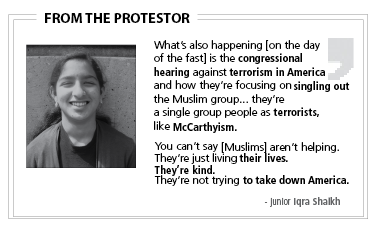Insults directed toward Islamic organization, Muslim students respond
Twelve members of Muslim Students Association met in C110 during lunch on March 18 for their weekly club meeting. At the end, six of the club members began their noon prayers. Laying out a prayer mat on the ground, they went through each step, kneeling in slightly graying socks and the girls readjusting their hijabs as they needed to. But when junior Omair Ahmad began the khutbah, similar to a sermon, the words he spoke were different from the norm.
This khutbah was written in accordance to a display of anti-Islamic sentiments in Yorba Linda, California. On Feb. 13, the Islamic Circle of North America held a fundraiser at a local community center. Outside, Yorba Linda residents protested. They chanted that the Muslims beat their wives and children; and that Mohammed was a fraud. Deborah Pauly, councilwoman, said she knew Marines who would be glad to send “these terrorists to an early meeting in paradise,” a sentiment that was greeted with laughs and cheers. The fundraiser was for ICNA Relief USA, an organization for disaster aid and womens’ shelters.
At the March 18 meeting, history and government teacher Christopher Chiang asked the MSA members for their opinion.
“Have you been following the news in Orange County?” Chiang asked.
“Decently,” replied junior Iqra Shaikh, MSA’s social outreach manager.
“Do you think [ICNA] should have backed down and dis-invited some of the guest speakers?” he continued.
Shaikh answered, “I don’t know.”
The controversy was that the two ICNA guest speakers were believed by some to have radical, Islamic views. Siraj Wahhaj was allegedly connected to the 1993 World Trade Center bombing, although he was never charged. Amir-Abdel Malik-Ali is connected with supporting Hamas and Hezbollah, recognized as terrorist groups. The fears of the Yorba Linda protesters were not fully unfounded, but some Muslim students argued that the humanitarian purpose of the fundraiser and the everyday people and families that attended should have been more important to the protesters than the matter of the guest speakers.
So on March 17, the day before the weekly MSA meeting, several students participated in Fast for Tolerance, a silent protest that was not an MSA event, to raise awareness of the Yorba Linda protest. The students fasted from sunrise until sunset for that Thursday to demonstrate the ideals of Islam
“You fast,” Shaikh said. “It’s supposed to teach you patience and perseverance, so we thought, ‘Why don’t we protest by fasting?’”
Fasting, instead of making a scene, was representative of who Muslims are and what their religion is, according to Shaikh. The participating students wore signs that prompted people to ask what Fast for Tolerance was about. Forcing people to ask and then hear about the original fundraiser in Yorba Linda is the center for their goal of raising awareness and education in the community.
“I walked in and somebody asked me from across the room [about the sign] and someone else came in and asked and the teacher was there,” said junior Saquiba Tariq. “I just held up the paper [sign].”
For senior Saba Ali, the protest did not get the same response. She said, “For me, not many people were interested when I told them. Not many asked.”
For many students, the silent protest went by as quietly as the instances of discrimination or ignorance in the local community. Although Shaikh says that they may not always happen at MVHS, it happens within the Muslim community. Junior Zanaib Memon can recall when, in sixth grade, a student asked her if her family were terrorists.
“Everyone has a bad perception of us,” Ali said. “If you hear the Youtube comments [from the Yorba Linda protest], they’re the complete opposite of what Islam is about. They had comments like ‘Go home!’ but this is our home.”
The Yorba Linda protests happened in a community different from Cupertino’s, but the distance did not affect the sense of action that caused students to organize a counter-protest to that day.
“All the Muslims are like one person,” Shaikh said. “So if one arm is hurting, everybody else is hurting. From that perspective, your brothers and sisters in Islam are getting hurt. You should stand up for them. Being able to stand up for other people, it doesn’t necessarily apply to the Muslim people. It can apply to a larger community.”








